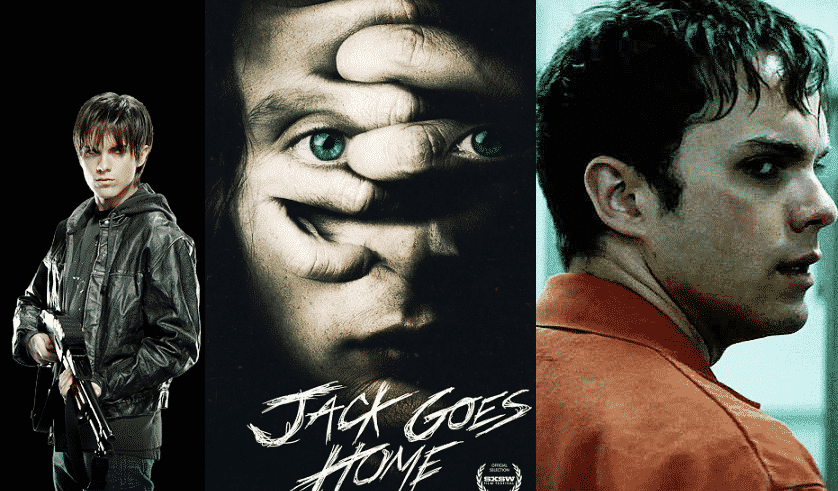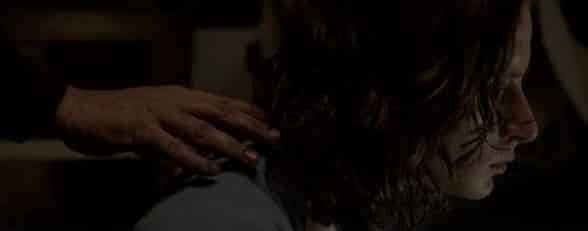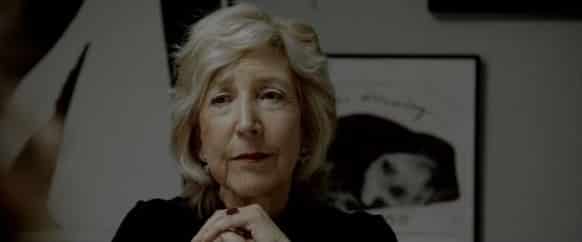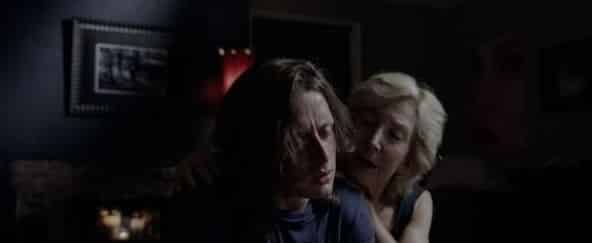Jack Goes Home is the latest thriller to come out for the month of October, following a chilling psychological journey of Jack (Rory Culkin) as he nurses his mother (Lin Shaye) after losing his father to a fatal car accident. From there, demented secrets long buried rise with his history and very identity, creating the multi-layered madness Jack has latched himself onto that strikes several nerves just watching it unfold.
Distributed by Momentum Pictures, this is the second film to be directed by actor Thomas Dekker (as well as scripted), recognized best for his roles in The Sarah Connor Chronicles as John Connor and A Nightmare on Elm Street (2010) as Jesse. Dating back with his experiences as early as John Carpenter‘s Village of the Damned, Dekker immediately understood his passion for the film world and experiencing the character aspect for so long has branched him to further into the technical representation of movies.
Representing ScreenGeek.net, I had a one-on-one with Thomas Dekker himself, discussing insight on the film’s characters and atmosphere, the personal experiences attached and some of his previous roles he took in his acting career, personal thoughts included:
Thomas, Tom, what do you prefer?
Tom, Thomas, whatever you want, just not Tommy. [laughs]
Alright, well I just got to say, I saw your film and it was very disturbing thriller, really brings out the horror of the human psyche. Captivating, really enjoyed it myself.
Oh, thank you so much Martin, that really means a lot. Really does, thank you.
Well, my first question is we see there’s a very focal presence in Jack’s past and how he interacts with his present to coming back to his birth home and mother. Home is usually seen as a place of comfort, security, familiarity, and I realize it’s a very interesting choice of title. Can you tell us about the film and do you believe the idea of Jack “going home” be looked more symbolically than the physical act of?
Oh yes, absolutely! That was the, you know…I’m probably answering other questions that you ask, but you know, the genesis of the whole project was that my father died in 2010 and I had been sort of doing my own thing as a young person does, away from my home town and away from my family. My father passed away from a struggle, an 11 year struggle with Alzheimer’s, so it’s very different from the sort of emergency accident that Jack undergoes, but the idea was when my father was passing away, I took a year off of my acting career and went home to take care of him, and it really was during that process that I discovered a lot of things just about my life and my past and so “Jack Goes Home” isn’t at all the technical or physical of going home, it’s really about going to the core of who you are, and it’s normally kind of a nice thing, but in my case, well my case wasn’t as bad as Jack’s, I will say that.
Thank goodness.
[laughs] Yeah, it was sort of the nightmare version of what I had, but it was kind of a metaphorical title and intentions of going to the root of yourself and finding that root is locked. That’s really what the movie is about.
Speaking of Jack specifically, very interesting psychological profile throughout the film, and even for a protagonist character, he’s distanced yet very compelling from even the audience perspective. He has very disjointed characteristics, relationships perplexed, how his coping mechanisms are. How would you describe to us his mindset and reactive nature in the film?
Well I think that the key really is that the film…the biggest indication of what the film is going to be is literally the opening, I think like a 4 or 5 second shot, that we open on Jack’s eyes, because the film is really…it’s sort of my way telling the audience this is all his perception, we’re really living the film completely through his point of view and so, his sort of disintegration of everything and viewpoint…I really wanted the film to go mad with him, so my goal from day one was that this was runaway train of grief, and it starts going one way and veers off into another, so his grieving process is very very fractured and so is the film itself. I don’t know if that answers your question at all.
It does, and it actually does lead into the next one. One thing I realized, the atmosphere. The use of strong imagery, especially at the beginning , the transitions between surreal, and like you said, very fragmented human interactions and Jack being this awkwardly shelled person. There is a really blurred line between reality and what goes on in his head with how the pacing is established. How do you feel your style represent the film and its identity and do you feel your experience as an actor and knowing the process of playing a character help understand the perspective better in some way?
Well, I think that definitely my experience, obviously, since I haven’t done it since I was 5 years old, had a huge hand in how I can communicate with the actors because when I’m on the directing side, really my interest is, I’ll be honest, is very, very technical. Very much, the, you know, the viewpoint of “okay, how’s this going to look? how’s this going to be designed?”, so the acting element is kind of at the bottom of my list. But because I’ve had so much experience with that, I sort of know, and a lot of these actors you have to remember – with the exception of Rory Culkin and Lin Shaye, I’d worked with every single actor in the film as an actor. So there was an intrinsic understanding of “okay this how they operate”, “this is how they work”, “this is how they think”. So ultimately, which was a challenge, my two leads being Rory and Lin, the only two people I never met before we made the film, that was a bit of a challenge. But Rory and I had a complete understanding of each other, and we purposely put a week in before we started shooting, where I got about 48 hours with each actor, just to go through the script and rehearse, and talk and re-edit and re-write and sort of, to enable it to our being, because you know, the character of Jack, to sort of answer your previous question, it was a very tricky thing because when Rory first read the script and I first spoke to him, I said “you know, this guy, I’m not trying to pull the heart strings here in the beginning”. This is sort of the challenge of the film.
Time is of the essence?
Yeah. I didn’t want him to be some sort of melodramatic “oh, this poor guy he lost his dad” situation. I wanted him to be detached – because he hasn’t realized it yet, and so it’s tricky because it’s a film about grieving but the only way the grief is depicted is by his loss of sanity. There’s only one scene in the film, really, where he cried and there’s only little bits of evidence of how close he was to his father. For instance the only moment when his fiance says on Skype “your dad was your best friend” and he’s already so emotionally destroyed already from the very beginning of the film that he can’t really admit it – certainly not to himself. And so it’s a difficult challenge that the film is trying to put on the audience of saying “okay I feel bad for this guy but not through the typical movie tropes of manipulation. I feel bad for this guy because I’m realizing his loss of sanity is an indication of how much pain he’s actually in”. That was a very tricky thing in the writing and also with the performance from Rory but Rory was extraordinary in the movie and really went with it with hopes that it would come out in the end but I hope it did.
Well, a lot of depth was certainly felt through that. It was an escalating journey. Definitely eyebrow raising. And it just kind of kept going upwards and upwards.
Oh good! Thank god, great, okay, great. [chuckles]
Speaking of Rory and Lin, the relationship between Jack and his mother I thought that was one of the prime aspects of it, it’s a peculiar one, even as far to say broken to say the least. They have different ways of coping with death, you know, father/her husband with life itself. Both are equally as haunting, and especially during the second half and it’s unsettling to it…took me a little bit about the process of that actually. [laughs] Rory and Lin really relish the sanity of the two and it seems like their prior experience with like thriller and horror films, “Insidious”. “Nightmare [on Elm Street]”, seems to be really evident of that. What was the driving factor to cast them and what was it like to have the two undergo such a suspenseful chemistry? Considering you said you never worked with the two – this ought to be an interesting question.
Yeah, Rory has just been one of my favorite actors for years. I’ve always considered him to just be…anything I’ve seen him in, he just has this capability but is very odd at the same time and I think subconsciously, I was sort of writing it for him from the get-go just based on his work that I see, and I knew I needed an actor who was brave, because in many ways, I wasn’t going to lie about it, whoever was going to play Jack was basically playing a version of myself. It’s such an autobiographical story that I needed someone who had the balls to be manipulated and directed by a director, but knowing that they are playing a version of the director, so I just thought that he, you know, which is a big challenge and Rory, I think I talked about that a bit, it was really from the get go he was the first person that I had the script sent to, and he actually immediately with no sort of struggle and he wanted to do it.
In the case of Lin Shaye, Lin has been an actress that I admired for years and years and years. It’s funny, it depends on the group that you go to; on the one hand, one group will say “oh, she’s the queen of comedy”, like outrageous comedy. You go to the other hand and they say “oh, she’s the queen of horror movies” – which probably shouldn’t be lunged together when done well, but…
Versatility.
[laughs] Yeah, exactly. I always felt that she was an artist, and I felt this was a role that she hasn’t tackled before, and most importantly I wanted a mother who felt age appropriate, and Lin actually has a 26, 27, 28 year old son of her own, and the sort of pressures of the finance years which cast sort of young, for better or worse of the word, “young hot mom”, and I said “No, I want someone who feels more age-appropriate for Jack”. It was honestly just a complete blessing, I thought she was such an extraordinary actress. My producer had worked with her before. We sent her the script, and she said she wanted to do it. I know for Lin it was a bit of a struggle because that was very very close to when we started shooting, and Lin likes a lot of time to prepare. We literally met and had our couple days of discussion like I said, that sort of time period to talk with the actors, like right before she started shooting, and I know she was very intimidated and I think a bit frustrated, but I think all that in the end worked out well in her favor.
Maybe some of that intimidation really helped for her role when she had a very dangerous presence at points.
Yeah, she is kind of the…you know, I’ll say this, I don’t know if this is going to ask but I’ll say this that I haven’t said to any interviewer yet: her menacing presence, we had a lot of discussion about this, I don’t believe that what we see of Jack’s mother is actually who Jack’s mother is. I think it’s actually an indication of his fear of letting go. The whole movie he’s looking for a villain because he can’t comprehend the fact of losing all good people, so everybody in a sense has to take on a negative persona, to get over it. It sounds pretentious and bad, but that was the intention.
Hey, that’s how some people really cope with some relationships breaking up really.
Yeah, you know, it’s like when you break up with your girlfriend and you’re like “oh, what a bitch”. [laughs]
Yeah, pretty much. [laughs]
Well, she actually wasn’t, but I got to say that so I can cope.
And feel better about yourself.
Exactly. [laughs]

Going to your acting career, one of your most recognized works was playing John Connor in “The Sarah Connor Chronicles”, the TV adaptation of James Cameron’s Terminator franchise, which was cancelled. What do you feel was the reason for its shortness?
I mean really, at the time, the show was the most expensive show on Fox, and it was very ambitious and I think there was a bit of a clash between the artistic control of Josh Friedman, the show’s creator, which I think is why the show is still loved because it was a kind of singular vision, but I think that was a bit frustrating to the network, shelling out all this money for something they didn’t really have a say in. And the viewership started to damp down and so it was just one of those things where at the time, it was after Dollhouse, and they chose Dollhouse. I miss that show very very much and umm…yeah. I don’t know what else to say.
A real power struggle from the sound of it. I’m actually leading up to this next one and it’s actually connected to the film you’re making. I felt with the directing perspective, I feel, Jack Goes Home really shows an ambiance of suspense throughout it, and execution was vivid. From a personal view, I saw one of the biggest things that made the first two Terminator films such a success was their level of trepidation and intensity paced just right, almost like a thriller film of its own than just a sci-fi. Would you consider returning to the franchise again, perhaps even in directing with it? I feel in that sense with Jack Goes Home could attribute it back to its roots in a way.
Oh my god, I would love…I mean, that is like an insane pipe-dream. But yes, and I have to admit, there’s very very few scenes, as you know as you’ve seen the film, that are “action sequences”, but on our budget they were sort of looked at as a thin scale of like cars crashing and houses blowing up and whatever, and I have to say those were the most fun days I had of directing because it was sort of like overlooking rats in a maze, it’s not really this sort of sensitive acting direction, but of course that’s my other favorite part of it. Thank you very much for saying an eye for tension there, but for sure, if that’s sort of where you’re culminating to, my goals is sort of what I’m interested in film making have been set since I was 5 years and I worked with John Carpenter. Watching him orchestrate scenes of tension and action sequences. That’s really shaped what I wanted to do as an actor and as a filmmaker. Since that day in 1994 or whatever the fuck it was, that’s really been the universe of film making I’m interested in. I don’t think I’ll ever make a comedy or a rom-com, it’s just not in my blood. I like dark, tense…you know.
Psychological profiles.
Yeah, that’s the world, and I don’t know really other than that inspiration of working with him when I was a little kid, I don’t know where else it comes from, it’s just sort of what I was born with. That’s just sort of the outlook in film I am drawn to.
Alright, well one more question because I know Ted is going to bust my ass anytime soon (we were on a timer). It’s the month of Halloween, and I figure I give this a decent mention. I was hoping to maybe get your thoughts on a film you were previously involved in, a specific remake of the classic Nightmare on Elm Street film. It really split reactions from a lot of film goers and fans alike and…personal thoughts? And well…from your perspective as a director, coming off such a visually successful film to me, what do you feel could have improved that film’s vision as a horror/thriller film?
What do I think could have been improved on that remake?
Yep.

It’s a tricky one to talk about because…I would say it was an honor to be a part of it. I think the cast as we know, we had two, now one-time Oscar nominee and another two-time Oscar nominee who’s still a very good friend of mine, Rooney Mara, and I think the issue at hand with that movie can’t really be thrown at the director because the director was basically a gun for hire to make it look good, and he did that. It looked great. But it’s basically like, you know, most good films tell a story, that film was to sell a tuxedo. It’s a sales movie. It’s” okay, we got this idea we’re going to take and we’re going to make money off it, so let’s just do that”. Even though the intentions of the artistic forces behind it were “Okay, we’re going to open up the mythology of Freddy Krueger, we’re going to make him darker and actually explore the idea of child sexual abuse” and those are all the things that interested me. Of course, at the end of the day when you have to put it in 1,000 theaters or more, obviously more, you have to shy away from those things and just make it a sellable entity. So I think you can’t really start judging the leaves of a tree if the seed is fucked.
Right.
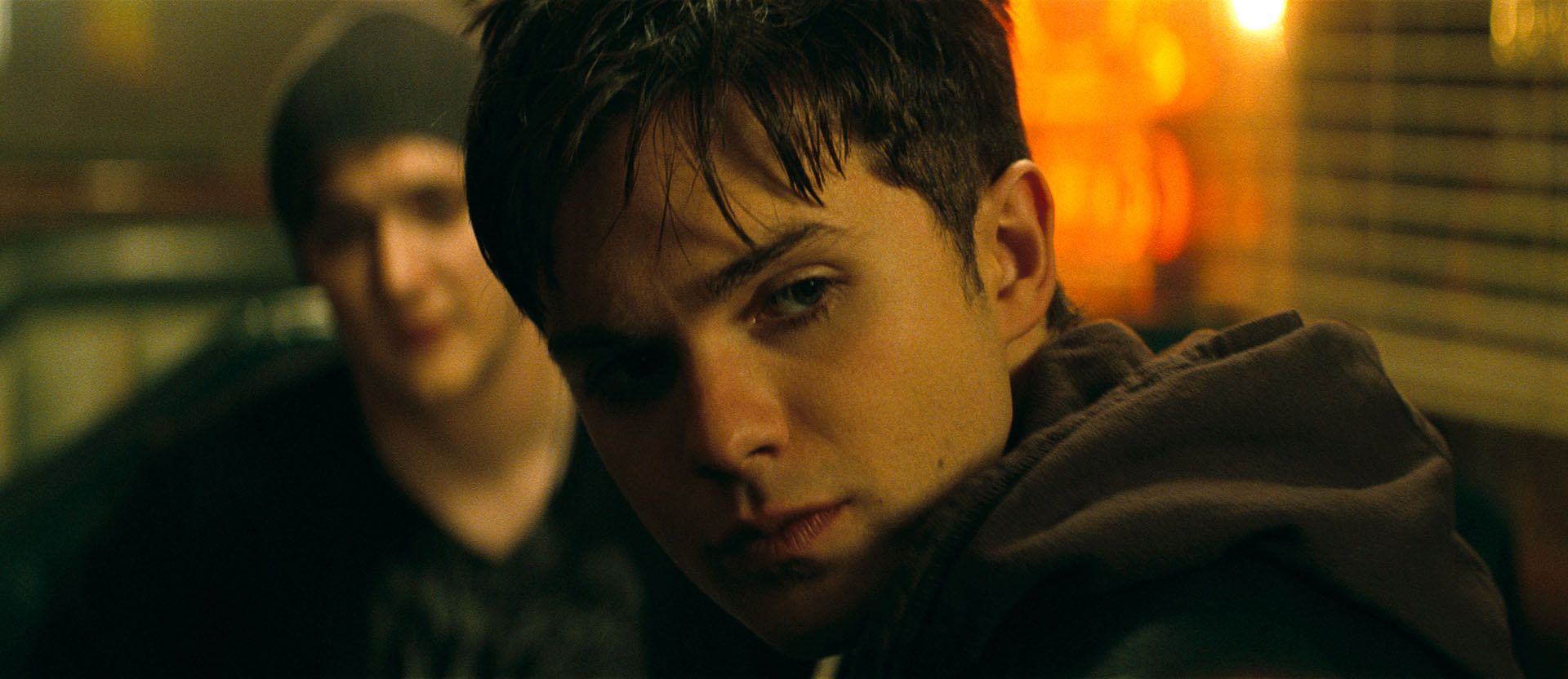
And that’s that situation. The unfortunate part is if it had been an independent film, sort of inspired by “Nightmare on Elm Street“, I think it could have been something really special, but in order to afford that brand, then you have to cater to the lowest common denominator, and that’s what happens with these remakes. You’re not allowed the privilege of originality if you’re not coming up with an original idea. (pause) I don’t know, that was a lot of words I just threw at you, I apologize.
No worries, no worries.
Thank you so much for your kind words, I really appreciate you watching the film and what you thought about it. I appreciate it, thank you.
The pleasure was mine, Tom. Pleasure was mine. You guys enjoy the rest of the interview process.
You can listen to the full interview’s audio on the video below:

Jack Goes Home, directed by Thomas Dekker and distributed by Momentum Pictures, hits US Cinemas and Video on Demand this Friday.

